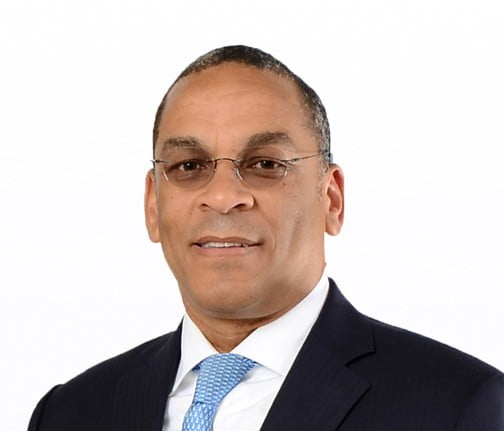NASSAU, BAHAMAS — A top insurance executive predicted the government will have to increase the Value-Added Tax (VAT) rate within two years after the next general election.
Anthony Ferguson, CFAL’s founder and president called for a conversion of the business license fee to a corporate tax during a CFA Society Bahamas webinar yesterday.
He also echoed calls for tax reform in the country.
“Right now the country gets 37 percent of its revenue from VAT,” Ferguson said.
“The duties that we pay are still a significant amount. At one point the financial services sector was about 25 percent of GDP. If it’s 10 percent now that’s a lot. I would submit it is lower.
He continued: “We continue to operate a high tax jurisdiction but we don’t call a spade a spade. I think we need to convert business license into a corporate tax. We can delay it but if I don’t pay income tax in my lifetime I am sure that my daughter or her kids will pay it because we will not have the working class resource to support the taxation system. We are going to have to adjust that.
Ferguson said: “Right now we pay 12.5 percent VAT. I submit that within two years after the next election, whoever is elected will have to increase the VAT. That is inevitable.” Ferguson said government should move to immediately convert business license to a corporate tax on net revenue.
The insurance executive also suggested the country’s GDP will contract by 10-15 per cent, far beyond government projections. Ferguson said that the COVID-19 pandemic has presented an opportunity for the country to assess its management.
“The problem as I see it is that successive governments since 1973 have had a particular focus on tourism which has and continues to serve us well. I believe however that this has limited the ability of politicians and their advisers so see cracks in the system and to imagine alternatives,” said Ferguson.
He noted that the Bahamian economy hasn’t grown significantly for the last five years, adding that along with slow growth, Hurricane Dorian which took 15 percent of the economy offline, The Bahamas is now also facing the fallout from COVID-19.
Ferguson argued that productivity in the country must improve and the government must ‘rationalize’ the civil service.
Ferguson added that one of his major concerns is over government’s decision to borrow a significant portion of the $1.3 billion it plans to borrow in foreign currency.
“We have about $2 billion plus in foreign debt. Continued foreign currency borrowing is extremely expensive. When you continue to borrow in foreign currency it really begins to impair your one to one dollar parity. I hear people talking about we have sufficient reserves but if that is the case why are you borrowing 90 percent of your new debt in foreign currency bearing in mind that in 2024 we will have a maturity of $300 million we will have to refinance” Ferguson questioned.
Ferguson suggested that the country’s economic recovery will likely take longer than 18 months. He added that the country must be “imaginative and aspirational” at the same time.
“Citizens have to call on the government to now allow this crisis to go to waste,” said Ferguson. He further argued that the government’s budgetary allocation for agriculture and fisheries demonstrated that it was “not serious” about food sustainability in the country
“Until we are prepared to get serious we will continue to find ourselves putting our head in the sand and the country growing slower and slower with increasing deficits. If you put the right resources in poultry and egg farming for instance, in 12-18 months you can be well on our way to creating an alternative industry,” said Ferguson.


